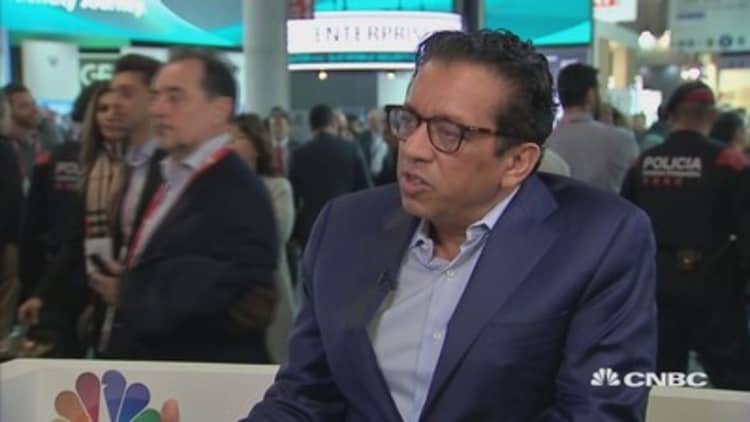SoftBank's massive Vision Fund said in 2017 that its minimum check size is $100 million. But in the financial-technology market, the number appears to be twice as big.
Executives at a half-dozen fintech companies said the Vision Fund has told them it's looking to do deals where it can put at least $200 million to work over one or multiple investment rounds. These people asked not to be named because their talks with SoftBank are confidential.
The Vision Fund recently attempted to invest about that much in online real estate company Opendoor, but the two parties didn't come to terms, sources familiar with the deal told CNBC. According to a report last month from the Wall Street Journal, Opendoor, which helps people buy and sell homes, is raising money at a $2 billion valuation.
An Opendoor spokesperson declined to comment. A spokesperson for SoftBank said in an emailed statement that there's been no change to the investment strategy.
"We partner with fast-growing companies that seek at least $100M to help achieve their ambitious goals," the statement said. "We don't have a different capital threshold for fintech companies."
The Vision Fund, which SoftBank CEO Masayoshi Son announced in late 2016, has no choice but to write huge checks because it's operating out of a $100 billion pool of capital.
It's put billions of dollars to work in ride-hailing companies across the globe, including Uber and China's Didi Chuxing, and hundreds of millions into start-ups in many other categories, including dog-walking company Wag (it invested $300 million), food delivery provider DoorDash (it led a $535 million round), and virtual reality infrastructure provider Improbable (it led a $502 million round).
Rajeev Misra, CEO of the Vision Fund, told CNBC in February that the firm had invested in 30 companies and that it would eventually reach 70 to 100.

Fintech is a big opportunity for the Vision Fund, because cash is critical in building out lending and underwriting operations and there are plenty of areas where emerging companies can take on giant slow-moving banks. Consumer and business lenders are among the other types of companies that have held talks with the Vision Fund.
SoftBank has already placed some bets in the market. In December 2017, the Vision Fund invested $450 million in Compass, a real estate technology company. Earlier in the year, the fund put $250 million in Kabbage, which makes loans to small businesses. And in 2015, SoftBank led a $1 billion investment in SoFi, a provider of education and personal loans. The SoFi deal came before the formation of the Vision Fund, while the investment in Kabbage officially came from SoftBank Group.
Think bigger
"We invested in Kabbage because their unique automated lending platform leverages open data networks and best positions them to empower small businesses around the world," David Thevenon, a partner at SoftBank Investment Advisers, said at the time. Thevenon is part of the vision fund, and multiple fintech executives told CNBC that they've held discussions with him.
The Vision Fund is quickly becoming known for pushing entrepreneurs to think bigger, whether that means expanding into new markets or hiring rapidly to beat the competition. Every executive who spoke to CNBC for this story said one of the firm's tactics is to ask, "What would you do right now if you had $200 million?" In some cases, the number was even bigger.
While plenty of start-ups welcome the influx of capital, the Vision Fund has many traditional venture investors and their limited partners on edge.
One concern is that companies will choose to raise big rounds from SoftBank rather than going public or selling to a larger rival. That would extend the amount of time before earlier investors and employees can cash out. SoftBank has loosened some of the capital bottlenecks by buying shares from Uber and WeWork investors as part of those deals, a strategy that some investors predict will become more routine.
Venture capitalists also worry that SoftBank is using debt in some deals and coming in with terms that can end up leaving companies hamstrung if growth in their business slows.
Financial services companies that rejected SoftBank's money gave various reasons. Some said they'd prefer to go public in the near future. Others sought better terms from other investors, while some simply didn't know how they could put so much money to use.
SoftBank is not the first mega-investor to make a splash in Silicon Valley. Investment firms like Tiger Global, mutual fund companies such as T. Rowe Price and BlackRock and foreign firms like Russia's DST Global have made big tech bets over the past decade, as have financial conglomerates including Goldman Sachs and Morgan Stanley.
But the $100 billion Vision Fund, which includes a hefty dose of cash from Saudi Arabia's sovereign wealth fund, is a different beast. The entire U.S. venture industry invested $84 billion last year, a 22 percent increase from the prior year and the most for any year since the dot-com bubble of the early 2000s, according to the National Venture Capital Association.
Talk to any VC and you're likely to hear that there's too much money chasing too few deals. Talk to any fast-growing fintech company and there's a good chance SoftBank has made an aggressive offer to invest.
— CNBC's Arjun Kharpal contributed to this report


